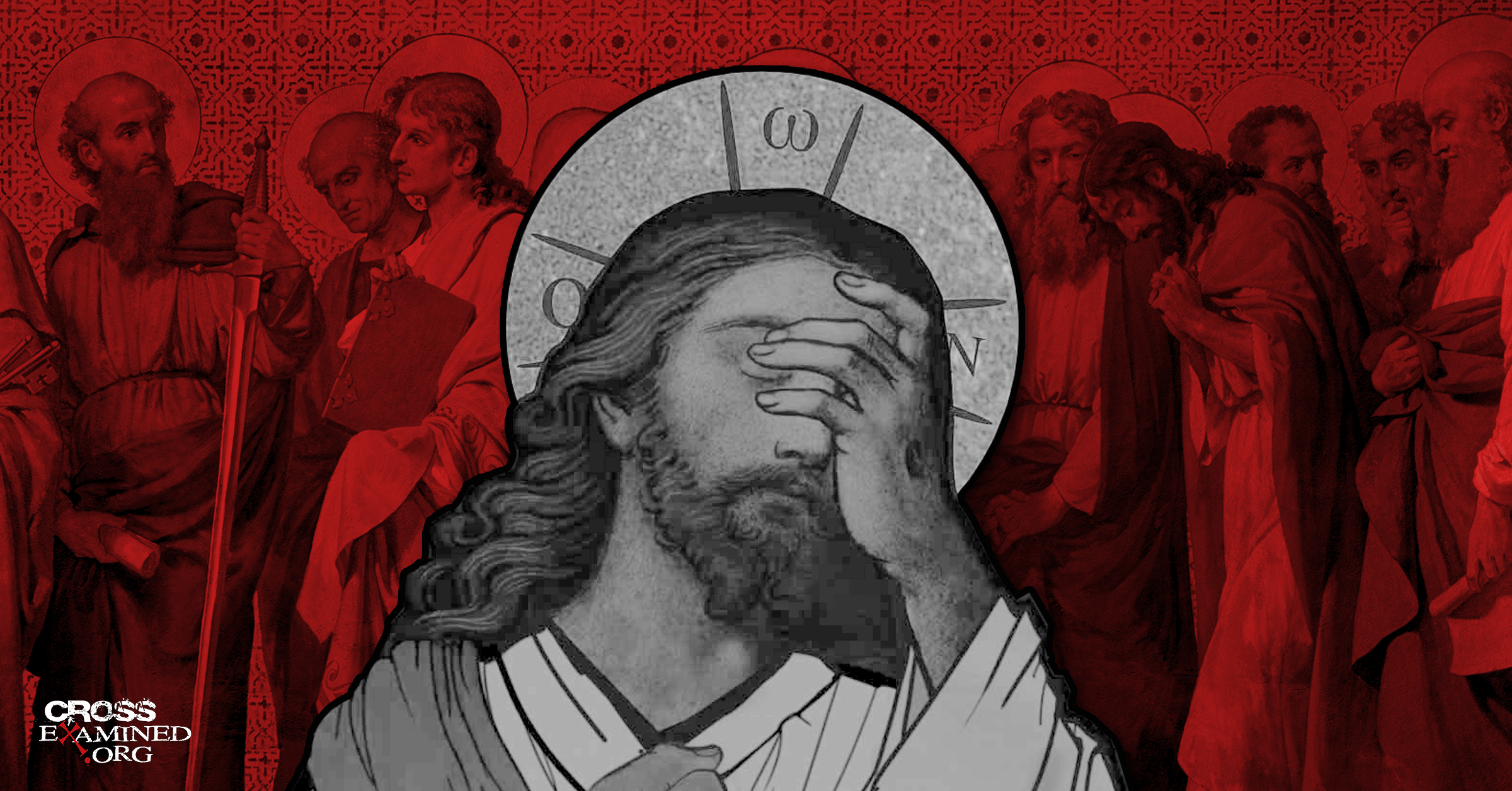I used to love sharing the minimal facts with unbelievers. It’s easy to present in a few minutes and sounds rhetorically powerful. When I tell my friends that the facts I’m sharing are universally acknowledged by scholars, even those who are skeptical, it seems like I am not coming at them with something that only conservative evangelicals believe. And on the surface, taking an end-run around the Gospels seemed helpful because unbelievers tend to view them as dubious sources.
However, I ran into a couple of issues. One was practical. Let’s say I got the skeptic to hear me out. Does it really make sense to say: “OK, I granted for the sake of argument that the Gospels are a hot mess of contradictions and historical gaffes. I now wanna take that back and argue that they’re much more reliable than that. You should accept orthodox Christian doctrine” The skeptic might ask “um… if that were true, why’d you start out granting so much for the sake of argument?” This feels like bait and switch.
WHY MAXIMAL DATA?
Plus, once an objection like grief hallucinations or mass delusions came up, I’d eventually have to back up and present other facts that skeptical and liberal scholars didn’t acknowledge. Any imagined rhetorical advantage evaporated. This approach didn’t really save time. If I wanted to defend the bodily appearances, the empty tomb, or the early persecution of the Twelve, I couldn’t “do it all with Paul.” I’d have to learn to defend the reliability of the Gospels and Acts. There are no shortcuts.
The good news is that this can be both rewarding and faith-building. You won’t be lost for words when you’ll hear a scholarly critic like Bart Ehrman lay out a list of complaints about the Gospels. You’ll no longer have to console yourself with “well, I’m not sure how to answer that, but at least the core facts are true.” You can read the Gospels and not wonder “is this part really defensibly historical?” Learning this approach kills cognitive dissonance.
OBJECTIONS TO MAXIMAL DATA
The only drawback is that you’ll be told you hold fringy views. But again, saying that there is evidence that the tomb was empty or the resurrection appearances were physical is already considered fringy to the scholarly consensus anyway. And importantly, scholarly politics can’t trump the force of objective evidence. It doesn’t mean that something is weakly supported by non-question-begging evidence because it isn’t granted by skeptical and liberal scholars. Nor does it mean we’re making a “for the Bible tells me so” argument.
When the skeptic asks, “what about all the contradictions?” you can offer to revisit them later and continue to make your positive case, rather than conceding them for the sake of argument. And by the way, the robust reliability argument can also be made in a way that’s just as quick and easy to share as minimal facts. It goes like this:
- Either the disciples were deceivers, deceived, or they were telling the truth.
- They were not deceivers. (They had good reasons not to lie considering they’d be ostracized and persecuted)
- They were not merely mistaken or deceived. (We can tell this by the accounts they gave of seeing, touching, and talking with Jesus over a long period of time after the resurrection)
- Therefore, they were telling the truth.
There! That’s not so hard now, is it? You could make that argument on an elevator. You just need to be prepared to back it up with additional evidence. So with this in mind, I’m going to tell you about 3 modern books you can pick up for around $50 total. And then I’m going to give you three older, public domain books that you can get off the Google Play store that won’t cost you a dime.
Resource #1: The Case For Jesus – Brant Pitre
This book helps answer a whole host of questions: Were the four Gospels really anonymous? Aren’t they written far too late to be considered reliable? Aren’t the Gospels folklore? What about the lost Gospels, like the Gospel of Judas or the Gospel of Peter? Is Jesus only divine in the Gospel of John and not the Synoptics?
Pitre offers some neglected evidence from the early church fathers and ancient manuscripts to demonstrate that the Gospels are not anonymous, as skeptics like to assert. Furthermore, he puts Jesus of Nazareth’s divine claims in an ancient Jewish context in a way that blew my mind. You won’t look at the phrases Son of Man and Kingdom of God in the same way.
Resource #2: Can We Trust the Gospels? – Peter J. Williams
This is a super accessible book and only 140 pages. The whole thing is great, but chapter 3 is worth the price of the book alone. Skeptics often claim that the Gospels were written decades later by people unfamiliar with 1st-century Palestine. If that’s true, we’d expect to find all kinds of errors regarding Palestinian geography, names, and customs, but Williams demonstrates time and time again that the Gospel writers get these details right, including many difficult types of details. Based on the data, Williams concludes that “The resulting Gospels are not what we would expect from people who made up stories at a geographical distance.” This serves as evidence that the evangelists were well-informed, consistently trustworthy, and close up to the facts.
Resource #3: Hidden in Plain View – Lydia McGrew
Having been largely neglected for over a century, Lydia McGrew revives an argument for the reliability of the NT called undesigned coincidences. In a nutshell, an undesigned coincidence is an apparently casual, yet puzzle-like fit between two or more texts, and its best explanation is that the authors knew the truth about the events they describe or allude to. These connections are among passages in the Gospels, as well as between Acts and Paul’s epistles. These lend credence to the idea that these documents were written by eyewitnesses who knew what they were talking about. This is relevant to developing a case for the resurrection. For if the gospels can be shown to be rooted in credible eyewitness testimony, you have to take seriously the reported nature and variety of the post-resurrection encounters with the risen Jesus as coming from the original eyewitnesses.
Seeing examples of this in action is the easiest way to understand it. You can find plenty of interviews and lectures on YouTube where Dr. McGrew shares this argument.
I’d also highly recommend her other two books if you are interested in learning more about the Gospels’ reliability. Those are The Eye of the Beholder (which is a defense of John’s Gospel) and The Mirror and the Mask, which argues against claims made by evangelical scholars that the Gospel authors felt free to present events in one way even though they knew that the reality was different. These are a little more technical than her first book, and a great place to start if you want to go deeper into the issues.
FREE RESOURCES
- Now, for the free resources: JJ Blunt’s book Undesigned Coincidencesand William Paley’s Horae Paulinaeare the non-updated versions of Lydia McGrew’s Hidden in Plain View. I still recommend you get Lydia’s book, because she picks the “best of” these undesigned coincidences, and she has discovered several more that are not in these older books. If you’re on a budget, these are great additions to your library. And if you’re not on a budget, get them anyway. Both of these books are still worth reading even after reading Hidden in Plain View.
Finally, get A View of the Evidences of Christianity by William Paley. I cannot recommend this book enough. Paley debunks Hume’s anti-miracle argument. He examines all the evidence that the original witnesses of Christianity were willing to undergo labors, dangers, and suffering in order to spread the gospel of the resurrection.
He goes into great detail regarding the authorship and early use of the Gospels, which includes the unanimous testimony of the early church and even some heretics. Paley takes us into the unity of the character of Christ in all four Gospels. This answers some of the “why’s John’s Jesus so different?” objections. Paley also demonstrates 41 instances where the Gospel writers make incidental allusions to history that can be confirmed outside the NT, even down to minor details. These illustrate the evangelists’ familiarity with the setting and their accuracy in recounting details. He discusses alleged discrepancies in the Gospels, prophecy, and so much more. I can’t do this book justice in a short video. Just get it. Sure, his style of writing is from the 18th-century and his arguments could use a little updating. However, this book has mostly stood the test of time and should not be forgotten.
Just search the Google Play store for these three public domain books and you can find free versions. There are many other books I could recommend, but these are meant to get you started. I just want to assure you that this isn’t a very difficult method to learn. It took time to learn the minimal facts approach, and you can take the time to learn this. There may be extra details, but we’ve seen that extra details are needed anyway to make a strong case. We can all find less time for Twitter, Instagram, or reading the latest political news, or binge-watching Netflix. You just have to set priorities.
Skeptics have poked apart the minimalist approaches to the resurrection for far too long. We need an army of Christian apologists who can make a more robust case. You can do this.
Recommended resources for this topic:
Early Evidence for the Resurrection by Dr. Gary Habermas (DVD), (Mp3) and (Mp4)
The New Testament: Too Embarrassing to Be False by Frank Turek (DVD, Mp3, and Mp4)
The Footsteps of the Apostle Paul (mp4 Download), (DVD) by Dr. Frank Turek
__________________________________________________________________________________________________________________________________________________
Erik is a Reasonable Faith Chapter Director located in Cedar Rapids, Iowa. He’s a former freelance baseball writer and the co-owner of a vintage and handmade decor business with his wife, Dawn. He is passionate about the intersection of apologetics and evangelism.
Original Blog Source: https://bit.ly/30z17Qb







